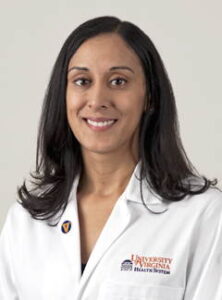Monica Lawrence, MD
EDUCATION AND TRAINING:
- MD, Washington University School of Medicine, St. Louis, MO
- Residency, Barnes Jewish Hospital, St. Louis, MO
- Fellowship, National Institute of Allergy and Infectious Diseases, Bethesda, MD
FUNDED PROJECTS:
- NIH/NIAID R21 AI151496 (PI: Borish), 03/01/20 – 02/28/22
Lung rhinovirus (RV) infection identifies pre-school children with type 2 inflammation at risk for the development of asthma
We hypothesize that in young children, rhinovirus infection in the lower respiratory tract defines a phenotype characterized by reduced innate immunity that underlies susceptibility to lower airway infection and contributes to a progressively worsening type 2 lung inflammatory milieu, ultimately leading to the development of asthma.
Role: Co-Investigator
Effort: 0.6 CM/5% - Jeffrey Modell Foundation, 07/01/18 – 06/30/21
Our designation as a Jeffrey Modell Diagnostic and Research Center for Primary Immunodeficiency (PID) provides us with funding to support establishment of a biorepository of patients with PID seen at the University of Virginia, including mononuclear cells, DNA, serum/plasma and clinical information.
Role: Co-PI
Effort: 2.4 CM/20% - NIH/NIAID U01 AI123337 (PI: Borish), 04/13/16 – 3/31/21
Clinical response to rhinovirus in human asthmatics
This project investigates the hypothesis that a distinct pattern of immune responsiveness to rhinovirus is generated in the upper airway of allergic rhinitic and asthmatic cohorts, which triggers the development of a Th2 cytokine signature state that drives the adverse outcome of rhinovirus infection in the lower airway of asthmatics.
Role: Co-Investigator
Effort: 2.4 CM/20%
RESEARCH AREAS:
Two primary research focuses:
- Severe childhood asthma, in particular the role of rhinovirus infection
- The role of IgE in primary immunodeficiency
RESEARCH SUMMARY:
Dr. Lawrence has a strong background in clinical allergy/immunology and translational research, which has given her the necessary expertise to carry out the proposed research. She has been engaged in translational research for over fifteen years, beginning as an undergraduate student at Duke University. During her residency training in internal medicine at Washington University in St. Louis/Barnes Jewish Hospital, she was selected for the competitive Clinical Scientist Training and Research (C-STAR) track, which included formal training in the design of clinical trials, bioethics, and biostatistics. Dr. Lawrence then completed a three-year combined clinical and research fellowship in Allergy and Immunology at the National Institute of Allergy and Infectious Diseases (NIAID). During her fellowship, she trained in the Laboratory of Allergic Diseases, Genetics and Pathogenesis of Allergy Section (PI: Dr. Joshua Milner). Work during fellowship focused on understanding the pathogenesis of primary immunodeficiencies characterized by severe atopy as a means to elucidate the genetic basis of allergic disease. During this time, she became proficient in multi-parameter flow cytometry allowing for complex phenotypic analysis of immune cell subsets and intracellular signaling. In addition, Dr. Lawrence became familiar with molecular biology techniques relevant to gene transcription and expression, next-generation sequencing techniques, and statistical analysis of complex datasets. After completing her fellowship in June 2013, she joined the Division of Asthma, Allergy, and Immunology faculty at the University of Virginia.
While at the University of Virginia, Dr. Lawrence has collaborated extensively with investigators both within and outside the Division to characterize the immune response to experimental rhinovirus infection in patients with asthma and allergic rhinitis. In 2020, she assumed responsibility as the head of the Rhinovirus Core Laboratory and, as such, sponsors two INDs related to the experimental rhinovirus challenge.
Along with her collaborator Dr. Larry Borish, she is also involved in studies investigating the role of IgE in patients with current or evolving humoral immunodeficiency.
With the support of the Jeffrey Modell Foundation, Dr. Lawrence has established a biobank of samples including serum, plasma, DNA, and PBMCs from patients with primary immunodeficiency that will be the subject of future research.

 PRIMARY APPOINTMENT:
PRIMARY APPOINTMENT: